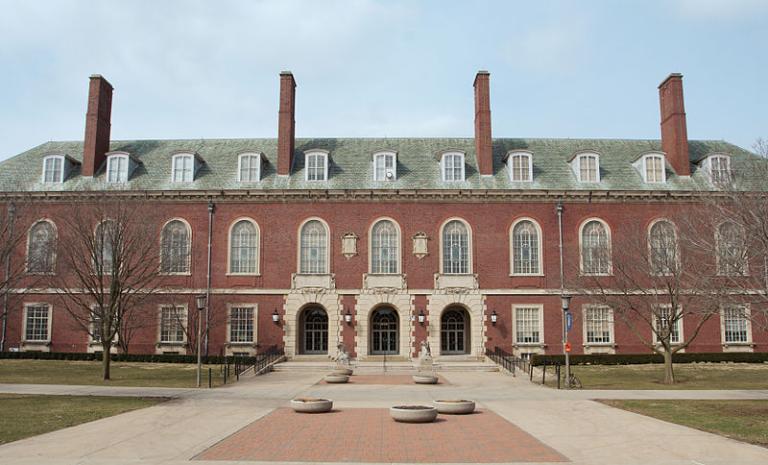![By Raysonho @ Open Grid Scheduler / Grid Engine (Own work) [Public domain], via Wikimedia Commons](https://wp-media.patheos.com/blogs/sites/533/2015/02/library.jpg)
So here’s a book of the genre that is, in the end, nothing new, but still discouraging. Colleges’ costs are rising at a fast clip, and students are getting less and less for their money.
Specifically, tenured professors spend less and less time teaching, as more and more universities declare themselves to be “research institutions,” and reduce their professors’ course loads in pursuit of greater prestige. Professors are recruited on the basis of promises of low teaching loads, and, once those expectations have been set, insist that teaching loads can never return to a formerly higher level, lest only the dregs of the professoriate stay on while everyone else leaves for greener pastures.
They justify the long hours spent researching on the basis that it benefits students, who will consequently have professors fully engaged in their fields of study. But at the same time, the research that is actually being produced is demonstrably of little value. And, no, that’s not just a matter of plucking studies and denouncing their foolishness. Instead, there are so many professors publishing so much, that there are increasing numbers of publishers producing journals with little to no peer review, to such a degree that “fake papers” are accepted with alarming frequency — and large numbers of those papers are neither being cited by others or even being read by anyone other than their authors.
What’s more, as professors teach ever fewer students, the large majority of instruction that students actually receive is from graduate students and part-time and temporary instructors. Now, some full-time long-term instructors may be skilled at what they do — they certainly get more practice than the professors — but to have so much teaching responsibility in the hands of very inexperienced grad students and adjuncts, who may receive little in the way of mentoring themselves, certainly belies the claim that students benefit from the professors’ low teaching loads.
At the same time — stop me if you’ve heard this before — the bloat was compounded by ever-growing numbers of administrators and staffers.
But, in bread-and-circuses fashion, students appear to be relatively indifferent to the quality of instruction they’re receiving; they are instead, by and large, more than happy to experience four (or five or six) years of relatively undemanding classes, accompanied by parties, sporting events, entertainment, high end workout facilities, and so on, as long as it gets them a credential in the end.
This took on its most extreme form in the scandal at the University of North Carolina – Chapel Hill, where it was learned that the African Studies department offered “paper courses,” independent study classes with a single requirement, a paper that wasn’t even graded, and wasn’t even, by and large, the result of any meaningful academic effort. To be sure, the scandal was in the context of athletes, but it was not just athletes that took these courses, but plenty of ordinary students; in some cases, students in demanding technical fields were recommended to take such classes in order to balance out an otherwise demanding semester.
And at the same time, things are getting worse, with increasing uproars over so-called “microagressions,” calls for “trigger warnings” and “safe spaces” and denial of due process to men accused of sexual assault — all of which run counter to the very idea of the university as a place of exposure to new ideas. And not just students, but also professors, are facing censorship and threats or actual loss of tenure and employment for failing to tow the line.
Oh, and the final outcome of these years of study or, minimally, attendance? A degree, of course, but only to end up doing work which objectively doesn’t actually require a college degree — as ever-growing numbers of graduates end up in jobs which don’t require degrees, or, rather, don’t require the skills or learning of such a degree, even though employers may nonetheless choose them over other applicants due to the degree.
What’s more, the new income-based repayment program essentially functions as a bailout, ensuring that students don’t suffer particularly much from their high tuition payments; this is especially true at the graduate level, where there are no limits to a student’s borrowing. What’s more, the repayment levels have been set low enough that the student loan program is experiencing substantial shortfalls — $22 billion in 2014, “the largest ever recorded for any government credit program” (p. 225), and potentially $250 billion over the next decade.
What’s the answer?
Sykes thinks it’s online learning: MOOCs (massive open online classes) offering certification for passing the class, as well as online programs like the new offering at Arizona State University, where successful completion of a set of online courses will grant students credit for the equivalent of the freshmen year of study, with no up-front costs, and $200/credit if successful — with the expectation that the credits can either be used at ASU or transferred elsewhere.
But —
and here’s where I stop summarizing and start opining —
I’ve heard this before. Not just in various articles, but even in a book that was one of my first “from the library” blog posts, in 2013, called College (Un)bound, which painted a similarly optimistic picture of the university of the future.
The problem, though, is this: the only thing that will force universities to change, is if the money, and the student body, dries up — and neither the current trajectory of income-based repayment, nor the Clinton promises of free college, suggest that this will happen. It may be that nontraditional students increasingly choose online learning, in particular, as replacement of for-profit companies like the now-defunct ITT Tech. But as long as sufficient numbers of high school graduates want to follow the traditional path, whether it’s because they think that path is necessary for a good career, or because they want the “residential college experience,” those colleges will continue to charge the same inflated tuition rates.
So I don’t share Sykes’ optimism. And as a parent of a high school junior, this is actually pretty dang discouraging.
[A few more morning thoughts:]
Fundamentally, this is a collective action problem. The typical high school graduate may still be better served with a (traditional) college degree, even if it means nothing more than having an edge on non-graduates when it comes to getting that secretarial job. The typical employer, likewise, sees it as an easy decision to hire someone with the “college degree” checkmark, because, for entry-level students, it’s an easy way to identify a minimum level of ability (otherwise, in the year 2016, anyway, you’re looking at hiring an 18 year old or questioning what they’ve done instead of college), and for older workers, it’s an easy way to winnow out some of a large number of applicants. (And, from what I understand, much of the market for companies like the University of Phoenix is older adults who have had a successful career without a college degree but get laid off and discover the rules have changed, that employers won’t hire them for jobs that their resume indicates they’re obviously qualified for, because they can’t tick that “college degree” box.)
So our country would be better served with a system in which high school students could transition to the world of work without a traditional “residential college experience,” whether it’s my old “liberal arts GMI” proposal, or a blend of community college and apprenticeships as would be the case in Germany. But individual middle-class parents are not going to be the ones to tell their kids “no” or be the first to deny their kids the funding for a “residential college experience” when all of their peers are opening up their wallets — and neither are individual high school guidance counselors going to recommend alternate paths. And neither are individual employers, in today’s still-slack labor market, willing to think creatively about who they hire, or willing to teach skills on-the-job.
And, yes, I’m not willing to stick my neck out, either, when it comes to my own kids — though right now each of them does want to pursue that sort of career (chemistry, aerospace engineering, architecture) for which a traditional degree is required.
image: By Raysonho @ Open Grid Scheduler / Grid Engine (Own work) [Public domain], via Wikimedia Commons













